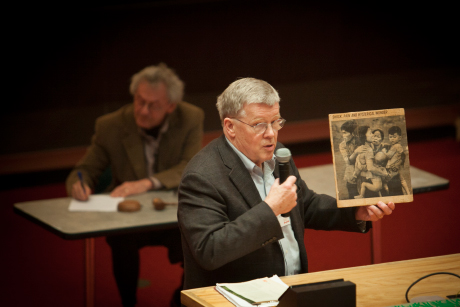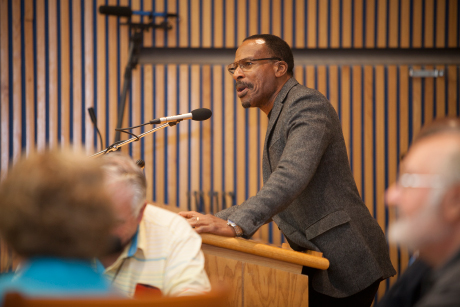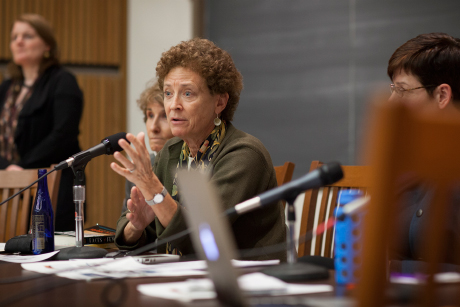Activists, Vietnam veterans share memories at teach-in
By Kathy Hovis



Teach-ins were common during the 1960s at Cornell; students gathered to explore volatile issues like the Vietnam War, racial discrimination and gender inequality.
A crowd of nearly 400 experienced something similar Nov. 10: a teach-in sponsored by the Department of Government and the College of Arts and Sciences, part of the two-day sesquicentennial event, “Vietnam: The War at Cornell.”
From stories of the horrors of fighting in Vietnam, to recollections of protests, to remembrances of students who were lost in the war, the 21 alumni and former faculty and staff who returned to campus shared their stories, as did current students, faculty and audience members.
James Matlack, an assistant professor of English at Cornell from 1967-71 and a Quaker activist, said reports coming from places like My Lai cemented his “anguish and righteous opposition to the war.”
Part of that anguish came after Matlack learned that one of the Cornell undergrads he had counseled about the draft enlisted and was killed by stepping on a land mine.
“His was the first name I found at the Vietnam Memorial,” Matlack said.
Most returning alumni were members of Students for a Democratic Society (SDS). They actively protested the war, encouraged students to turn in or destroy their draft cards and continually worked to educate the campus about the war.
“The war was happening to us, and the issues were clear,” said Susan Rutberg ’71.
Rutberg, a government major, after law school worked as a public defender and served as co-counsel on several Black Panther-related cases.
“Our opposition to the war was with our foreign policy,” said Joe Kelly ’68, “not with the soldiers.” Kelly turned in his draft card while a student and continued to work with SDS after graduation, spending three months in a Chicago jail for demonstrating at the Chicago Seven trial.
Several speakers spoke of their service as soldiers in Vietnam.
Terry Cullen, MBA ’66, the coach of Cornell’s sprint football team, enlisted in the Marine Corps after receiving his degree.
“Kennedy was my hero, and when he said, ‘Ask not what your country can do for you,’ I took that seriously,” said Cullen, who was severely wounded in battle and spent more than a year in a Naval hospital.
“It was a terrible war with tremendous casualties on both sides,” he said. “Just god-awful.”
But Cullen doesn’t regret his decision to enlist; he said it was important for him to serve.
Dave Juers, a network engineer in the College of Engineering, served in Vietnam in 1970; he was drafted after finishing graduate school. Juers thanked the activists who opposed the war at home.
“All of the soldiers there had peace symbols under the camouflage on their helmets; we were constantly giving each other peace signs,” he said. “Most of us didn’t want to be there. Knowing there were people at home opposing the war balanced some of the craziness that the war does to you.”
Trey Birdwell, executive officer of Cornell’s Army ROTC and an assistant professor of military science, said activism of the 1960s resulted in “measurable changes” in the U.S. military during the last 50 years, including increased support for returning soldiers.
“I was surprised to hear how big a part Cornell played in this piece of our national history,” said Abigail Warren ’15, an economics major who attended the teach-in and said she’s participated in some on-campus activism.
Isaac Kramnick, the Richard J. Schwartz Professor of Government and organizer of the event, said he was deeply moved by the two days’ events.
“It brought to life an important chapter in Cornell’s history for today’s undergraduates,“ he said. “It was wonderful for them to hear from opponents of the war and from people who proudly fought in it. … these alums visited some 18 classes during their visit and shared with undergraduates their stories of Cornell 50 years ago and their agonizing over America at war, as well as their concerns for racial and gender equality.”
Panels tackle race, gender battles of 1960s
Race and gender. For both issues, 1969 was a pivotal year, which included the takeover of Willard Straight Hall and a women’s conference at Cornell that eventually led to the Women’s Studies Program, now Feminist, Gender & Sexuality Studies.
Cornell went from having 25 African-American students in 1963 to 250 in 1969. Frank Dawson ’72 was a freshman when he and his friends joined other members of the Afro-American Society in the Willard Straight takeover.
“I called my mother to tell her what we were doing and she started crying and reminding me of how hard they worked to get me here,” he said. “But I told her that we were doing what was necessary.”
Because of the takeover, African-American students accelerated development of the Africana Studies and Research Center and pushed through other changes at Cornell.
“The commitment of the students was to a cause greater than ourselves,” Dawson said. “We were taking our education back to our communities to make our communities a better place.”
Dawson and classmate Abby Ginzberg ’71 are working on a documentary about the Straight takeover and similar events across the country. Part of the film, called “Agents of Change,” was shown at the Nov. 10 teach-in.
Bruce Dancis, who was at Cornell from 1965-67, became the first Cornell student to destroy his draft card. He said he came to Cornell to work with black students on civil rights issues but gravitated to the anti-war movement.
“[Black students at Cornell] told me that what I needed to do was to fight racism in the white community,” Dancis said. “That made sense to me.”
White students did support the Straight takeover, Dancis said, by forming a ring of marchers around the building to offer protection.
During the Nov. 11 panel on gender issues, Irene Smalls ’71, the first president of the Cornell Black Alumni Association and founder of Wari House, said she worked on civil rights issues as a student but was told she couldn’t be a leader “because I was a girl.”
Smalls said the feminist movement attracted her, but she felt alienated because the movement was led mostly by white women. “I didn’t see a lot of reaching across the aisle,” she said.
Susan Reverby ’67, a professor of women’s and gender studies/history at Wellesley College, said female students in the 1960s “were so conscious of what was going on to women, but we had no vocabulary to explain it or political way to think about it.”
Reverby said she didn’t feel oppressed by men on campus, but it was oppressive for women to realize that their identity was based on “who they were sleeping with.” If your boyfriend burned his draft card, she said, then you were also considered a radical.
She said the main problem for feminism today is “to make gender matter and not matter at the same time.”
Kathy Hovis is a writer for the College of Arts and Sciences.
Media Contact
Get Cornell news delivered right to your inbox.
Subscribe